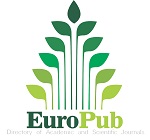Intersectional Identity: Bhabha’s Ambivalent Creative Zone in Mohsin Hamid’s The Reluctant Fundamentali
Abstract
The research aims to explore the formation of intersectional identity as collective identity that Hamid creates. The objective of this research is to understand Pakistani-Muslims as equally human as those beyond its borders. It allows the fraction under consideration to be interconnected as represented by the intersectional identity obtainable by ambivalent creative zone of hybridity. This research is important in the field of South-Asian literature as it looks at the ways in which borders physical or metaphoric affect identity construction through politics of labelling. The concept of ambivalent creative zone from Bhabha highlights the development and impact of intersectional identities in representation of Pakistani-Muslims in and across borders. This research will set the pace for viewing Hamid’s work as a creative space which is beyond limits set by culture, place, and stereotypes; offering itself as a ground for the construction of intersectional identities that have the capacity to co-xist.
Keywords: Intersectional, representation, interconnected, ambivalence, co-existence.










